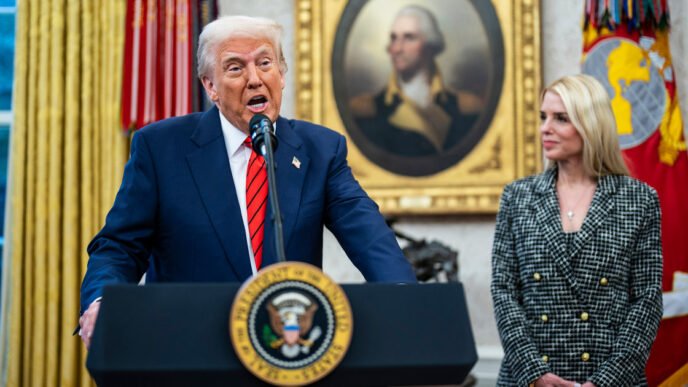CRANFORD, N.J. — Steve Fulop was almost done answering questions about his campaign for governor Saturday afternoon when he decided to pose a question of his own.
“How many of you think about electability?” Fulop, the mayor of Jersey City, asked the few dozen voters gathered at the Cranford Community Center. Almost every hand went up.
It’s the same question Democrats have been grappling with nationally: How does the party win again after a stunning loss to Donald Trump last year, when Trump made gains across the country — including in blue states like New Jersey?
Democratic voters in the state will have the party’s first big opportunity to weigh in on that question next week. New Jersey is one of two states this year with governor’s races, and it’s the only state with contested primaries, with voters heading to the polls next Tuesday to pick their nominees.
The six Democratic candidates embody different paths for the party. There’s a rabble-rousing progressive, a milit veteran leveraging the party’s 2018 playbook, a self-described “pragmatic progressive” taking on the party establishment, a moderate laser-focused on affordability, a longtime legislator stressing his blue-collar roots and a union leader rallying teachers.
And they are often quick to note that the country is watching.
“I think it’s going to set the pace for what happens nationally,” Newark Mayor Ras Baraka, who pitches himself as the true progressive in the race, said of the prim.
Democratic Rep. Josh Gottheimer, one of the more moderate candidates, also described the prim as a “bellwether” for the party.
“We can’t go down the same path,” Gottheimer said Saturday after a rally with supporters in Woodcliff Lake. “We’ve got to do things differently.”
Many of the Democratic voters the candidates are chasing are prioritizing electability as they weigh their options, according to conversations with nearly 40 New Jersey Democratic voters in recent days.
“We do not want MAGA to take over New Jersey,” said Cheryl Ashcroft of Point Pleasant, who is supporting Democratic Rep. Mikie Sherrill because she believes Sherrill has the best chance of defeating former Assemblyman Jack Ciattarelli, the GOP prim front-runner, who has Trump’s endorsement.
‘It’s the economy, stupid’
Gottheimer is among the candidates who believe Trump was able to make gains in the state last year, particularly among working-class voters and voters of color, by focusing on the economy and public safety.
Trump lost New Jersey by 6 percentage points, a 10-point improvement on his margin in 2020. That was the second-largest swing toward Trump of any state.
“My lawn signs all say, ‘Lower taxes, Jersey values,’ and they’ve said that since I first ran for Congress,” Gottheimer said.
“I’m a very heavily economic, lower-taxes, jobs message, and I think that’s where the party needs to go,” he added later. “If families can’t afford to feed their kids or put clothes on their back or pay their rent or their mortgage, everything else, while critically important, becomes second.”
A Woodcliff Lake resident backing Gottheimer named Nicole, who declined to share her last name, said she views Gottheimer as Democrats’ best chance to win in November and as the kind of candidate her party should elevate.
“I think that it is important for our party to get away from the fringes,” she said.
Steve Sweeney, a self-described moderate and former state Senate president who is also running for governor, said Democrats have lost their way with voters like him — a former ironworker who does not have a college degree.
“They don’t vote Democrat anymore because we, we’re not talking what they want to hear, which is ‘It’s the economy, stupid,’” Sweeney told NBC News after a news conference in Camden, referring to Democratic strategist James Carville’s mantra from the 1992 presidential campaign.
‘Effectively govern’
Sherrill, whom some consider the Democratic prim front-runner, has stressed her service as a Navy helicopter pilot and a federal prosecutor as she runs for governor. She is looking to leverage Democrats’ successful playbook from the midterms in 2018, when she and other candidates with public service backgrounds took back the House.
The “obvious” path forward for the party, Sherrill said, is to “effectively govern.”
“Ruthless competence is what people in New Jersey want to see in government,” Sherrill told NBC News before she marched in the Asbury Park Pride parade. “And that’s what I’ve always provided, and that’s what I think stands in stark contrast to the most incompetent federal government we’ve probably ever seen in this nation.”
Ken Urgo, 68, a retired food service worker from Galloway, said he is aligned with the far left but is supporting Sherrill because he believes she is the most electable candidate.
“I think Mikie Sherrill is a little too much of a centrist for me, but I think it’s going to take a centrist to win this state,” Urgo said, noting that Sherrill was once a member of the moderate Blue Dog Coalition, which she left in 2023 “to work with a broader coalition of leaders.”
“I have the best track record of anyone in the race of building the types of teams and coalitions and elections that win,” Sherrill told Donald J. Carroll Jr. of Fanwood, another voter who pressed her about her path to victory at a meet-and-greet in Watchung on Sunday evening. Carroll later told NBC News that electability is “really, really important” to him.
Sherrill noted that the three mayors in the Democratic race — Fulop, Baraka and former Montclair Mayor Sean Spiller — have never faced Republican opponents. She said the key is to lay out “why the Republican candidate is not serving people well and why my candidacy will be so effective.”
Carroll was satisfied with Sherrill’s answer and plans to support her in the race. But he is still concerned that some voters may be hesitant to back a female candidate, pointing to Vice President Kamala Harris’ struggles against Trump last year. While Trump gained 84,000 additional votes in New Jersey compared with 2020, Harris won 388,000 fewer votes than Joe Biden did four years earlier.
Anti-establishment angst
After Harris’ struggles last year, other Democratic candidates in New Jersey are pushing anti-establishment messages.
Fulop, the Jersey City mayor, told the voters gathered at the Cranford Community Center that Harris ultimately lost because “she was unable to articulate a clear vision of what the United States of America would look like that was different than Joe Biden, or with any authenticity and conviction.”
“I do believe that if you’re an establishment candidate, you’re going to lose,” Fulop told NBC News after the event. “I think the mood of the country has been clearly antiestablishment with both Democratic [and] Republican for some time.”
Fulop has been pitching himself as the candidate taking on the party’s political machine, and he said he appeals to “pragmatic progressive” voters. He has suggested that Democrats should distance themselves from Democratic Gov. Phil Murphy, since Republicans will look to make the race a referendum on Murphy’s administration.
Baraka, of Newark, another top candidate in the prim, also said Democrats need to take a more aggressive approach and push for progressive policies, though he acknowledged in a recent debate that some have suggested he cannot win in November because he is from Newark, he is “too progressive,” and he is “too Black.”
“New Jersey is ready for something different,” he said during the debate, “not the weak playbook of the Democratic Party.”
Baraka said Monday in an interview that voters “want to see Democrats be bold and exhibit some form of leadership.”
“Even the term ‘liberal’ makes people believe that we’re just soft, that we’ll do anything, we don’t have any position, we don’t have any plans, we don’t have any direction. I think we need to be, we need to show something different,” said Baraka, who was recently arrested at a federal immigration detention facility, though the trespassing charges were later dropped.
Chioma Nwankwo, 29, of Newark, who works in marketing, said she is leaning toward supporting Baraka. She said Democratic leaders in Congress are “out of touch,” adding that she wants her party to be younger and “more responsive” and to focus on appealing to working-class voters and racial minorities.
Spiller, the president of the New Jersey teachers union and a former mayor of Montclair, is also pitching himself as a candidate willing to take on entrenched interests — and comfortable criticizing his own party in the process.
“I truly think this our chance to do something different, and what that different looks like is finally electing somebody who’s not put there by big corporations, Wall Street, venture capitalists, big developers,” Spiller told NBC News after he took part in the Asbury Park Pride parade, adding later, “If we truly want to change it, not just have politicians who make promises that can’t keep them, we’ve got to change the way the system works.”
Spiller did not meet the fundraising threshold to qualify for the recent debates, but his campaign has been boosted by millions of dollars from a super PAC funded by the New Jersey Education Association, which he leads. He pushed back against criticism that teachers union dues are being used to support his campaign, noting that the union unanimously voted to endorse him and that it has historically supported its endorsed candidates.
The electability question
The persistent questions about which candidate can win underscore how Democrats expect a competitive race in November, despite the state’s typically blue hue.
Murphy’s 2021 re-election race was closer than expected, which he said later was a “can in the coal mine” three years ahead of Democrats’ presidential loss last year. Murphy defeated Ciattarelli by 3 points then, though he did buck a historical trend of New Jersey’s electing a governor of the opposite party of the president.
While Democrats now have that precedent on their side with a Republican in the White House, they face another historical headwind: It has been more than 60 years since the same party won three consecutive governor’s races in New Jersey.
And Democrats expect to face Ciattarelli again, though he first has to win a contested prim Tuesday.
“This thing could be razor thin in November, and Jack Ciattarelli is a tough candidate,” Gottheimer said. “This is not going to be a walk in the park for anybody.”













